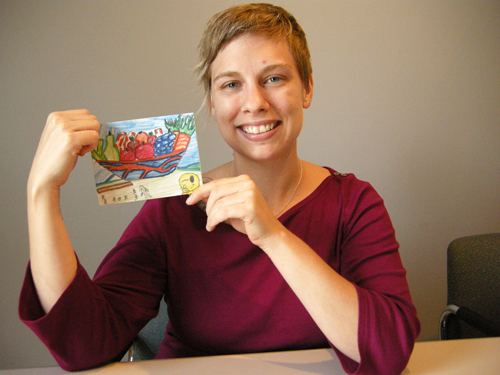
When kids go to school hungry, it’s tough for them to focus on learning. That simple observation is the raison d’être for Food and Friends, a program operated by the Children’s Foundation of Guelph and Wellington co-ordinating more than 80 student nutrition programs across the county.
Lindsay Irvine, a U of G grad with a BA in French and Italian, is fund development associate for Food and Friends. The initiative is funded in part by the United Way. “Food and Friends programs give more than 13,000 kids access to healthy breakfasts, snacks or lunches,” she says.
Most programs are based in schools, but a few are part of community centres. They are inclusive and open to anyone, which reduces the stigma for kids who participate. As Irvine explains, there can be many reasons why a child might be hungry: “Sometimes it’s a child who just forgot his lunch that day. In some families, the parents have trouble getting up to make breakfast or pack lunches, and in others they simply don’t have enough food.” One in ten children in Wellington County lives in poverty, she points out.
Whatever the cause, Irvine says providing nourishing food makes a real difference. “One principal told us that he’s seen fewer kids sent to the office for bad behaviour since the program started. Teachers tell us the kids have more energy and can pay attention better.”
While Irvine had always planned a career that would help others, she didn’t initially see herself working in a non-profit organization. She intended to study environmental science when she first enrolled at U of G but switched to French in her second semester. She got involved in campus groups and volunteered for OXFAM, Heart and Stroke, and Habitat for Humanity. “I was learning about how non-profit groups work and how they help the community, and I realized that was the kind of work I wanted to do.
After graduation, Irvine attended Humber College to complete a one-year post-graduate program in fundraising and volunteer management. She then became volunteer co-ordinator at the Ottawa Food Bank, moving back to Guelph a year later to take up her current position with the children’s foundation.
She works with the co-ordinators of various foundation programs so they can share challenges and successes, and develops fundraising programs to keep these valuable services going.
One example is the Live Free campaign that ran last March. “The idea is that participants live free of something – coffee, the car, processed foods – for one day, and donate the money saved to Food and Friends. Our slogan is Live Free to Help Those Who Live Without,” she explains.
School kids are involved in this as well, and are asked to donate a toonie as they give up something for a day. Of course, their take can be a little different. “One little boy announced that he was going to live free of underwear for the day,” Irvine says.
Irvine also spends time working with businesses in the community, encouraging them to adopt local schools and fund the student nutrition programs.
Finding volunteers to run the school programs can also be challenging. After the program co-ordinator retired in one Guelph high school, a student who regularly used the food program stepped up and offered to take over, even though he already had a part-time job. He’s graduated now, but Irvine says he did an amazing job getting the food, organizing the volunteers and completing the paperwork. “I think it shows how important the program was to this boy,” she says.
For some students, the food they get at school may be their only meal of the day. Many don’t recognize the fruits and vegetables given out through the program because they’ve never had them at home.
The Children’s Foundation of Guelph and Wellington runs three other programs. One is a grants program that provides money to low-income families who want to enrol their children in activities such as music, sports and camp. Another provides scholarships to teens who have been in foster care or who have overcome adversity in their lives.
The fourth program is Adopt-a-Family, where individuals, family groups and businesses who want to contribute are matched with families in need. The donors receive a “wish list” from the family and then purchase gifts to be wrapped and passed on during the holidays.
While active fundraising goes on for all the programs, Irvine says that United Way’s contribution is vital. So is the Food and Friends program. “There’s no doubt that every school needs a program like this, because every school has hungry kids.”
View a video about Food and Friends.
